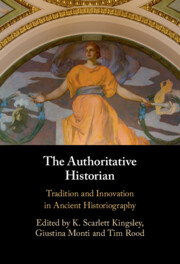Book contents
- The Authoritative Historian
- The Authoritative Historian
- Copyright page
- Dedication
- Contents
- Contributors
- Preface
- Abbreviations
- Introduction
- Part I Myth, Fiction, and the Historian’s Authority
- Part II Dislocating Authority in Herodotus’ Histories
- Chapter 5 Herodotus as Tour Guide
- Chapter 6 Interpretive Uncertainty in Herodotus’ Histories
- Chapter 7 ‘It is no accident that …’
- Chapter 8 Through Barbarian Eyes
- Part III Performing Collective and Personal Authority
- Part IV Generic Transformations
- Part V Innovation within Tradition
- Bibliography
- Index Locorum
- General Index
Chapter 7 - ‘It is no accident that …’
Connectivity and Coincidence in Herodotus
from Part II - Dislocating Authority in Herodotus’ Histories
Published online by Cambridge University Press: 02 December 2022
- The Authoritative Historian
- The Authoritative Historian
- Copyright page
- Dedication
- Contents
- Contributors
- Preface
- Abbreviations
- Introduction
- Part I Myth, Fiction, and the Historian’s Authority
- Part II Dislocating Authority in Herodotus’ Histories
- Chapter 5 Herodotus as Tour Guide
- Chapter 6 Interpretive Uncertainty in Herodotus’ Histories
- Chapter 7 ‘It is no accident that …’
- Chapter 8 Through Barbarian Eyes
- Part III Performing Collective and Personal Authority
- Part IV Generic Transformations
- Part V Innovation within Tradition
- Bibliography
- Index Locorum
- General Index
Summary
The quirkiness of the comment made by a character in Nabokov (quoted above) makes an apt beginning for an essay that will have much to say about meaningful coincidences. A reader who encounters Nabokov’s novel without knowing Herodotus’ story about Polycrates may be momentarily puzzled, though amused. Those who do catch the allusion will note the modernizing variant (a cuff-link, not a ring), and the added detail of its being the anniversary of the loss, a point that reinforces the unlikelihood of a parallel outcome; but above all such a reader will recognize that the climax has become an anti-climax: nothing happens, and the fish is just a fish. In a sense there is no story. Or rather, the story becomes effective here only through the contrast, because in Herodotus Polycrates did recover his ring from the belly of a fish. Nabokov’s outcome is, of course, overwhelmingly more plausible, but accustomed as we are to narratives in which loose ends are tied up, we feel that something is missing. In Herodotus, however, the general tendency is for items and episodes to connect, for links to be made, and for meaning to emerge from these connections. The following pages will explore how far that tendency extends, and the final section is intended to place Herodotean practice in a larger context.
- Type
- Chapter
- Information
- The Authoritative HistorianTradition and Innovation in Ancient Historiography, pp. 139 - 156Publisher: Cambridge University PressPrint publication year: 2023

